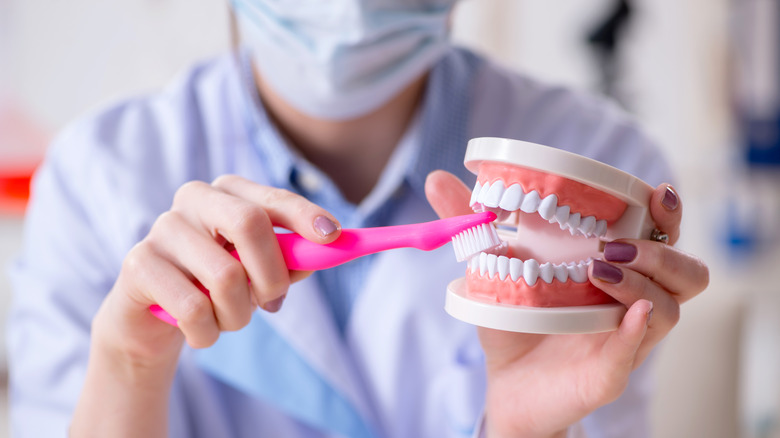Hospital patients face an unexpected risk: developing pneumonia while being admitted, according to NBC. In fact, non-ventilator hospital-acquired pneumonia (NVHAP) is a leading hospital-acquired infection in the U.S., affecting 1 in every 100 hospital patients and killing up to 30% of them. But recently, experts are saying that there could be a really simple solution to reducing NVHAP rates: improved oral hygiene.
When oral hygiene isn’t prioritized, the teeth can develop a biofilm that allows bacteria to grow rapidly (via NBC). These germs can trickle down the throat into the lungs, which can lead to pneumonia. Patients are more at risk for this infection when they lay flat or don’t move for long periods of time, which often happens to those admitted to hospitals. Patients are also more at risk when they either don’t receive quality toothbrushes or don’t receive proper dental care, especially bedridden patients who rely on caregivers to brush their teeth for them. Unfortunately, these are both common occurrences in U.S. hospitals and contribute to the high rates of NVHAP.
In 2024, a network called the National Organization for NV-HAP Prevention (NOHAP) was formed, a group of healthcare leaders who want to work together to prevent NVHAP and save lives. Luckily, that seems to be pretty feasible.
A simple solution

In 2024, a program known as HAPPEN (Hospital-Acquired Pneumonia Prevention by Engaging Nurses) began at a Virginia veterans’ hospital, and has since spread to more Veterans Affairs hospitals in the country (via Veterans Affairs). The program trains nurses to provide proper oral care and education for patients and has been wildly successful — it’s reduced NVHAP rates by 92% and has saved an estimated 13 lives in just 19 months (via NBC).
The HAPPEN program spends just $3-$5 per patient on oral care supplies, and it only takes two extra minutes of direct care for nurses per shift (via Veterans Affairs). In contrast, it costs about $40,000 to treat NVHAP per patient. HAPPEN predicts it will save more than $2 million per year, along with countless lives, through simple oral hygiene training.
Other recent studies have confirmed the importance of ensuring patients’ teeth are brushed twice a day. A 2024 study of 21 hospital facilities found that prioritizing oral care and getting patients out of bed regularly decreased the NVHAP rate by about 70%. This low-risk, low-cost solution could be the answer to an easily-preventable, deadly infection.